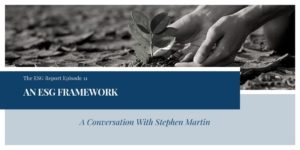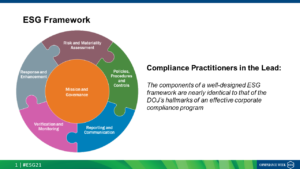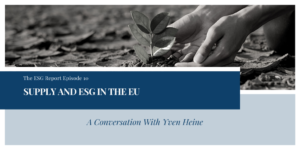
Tom Fox is pleased to welcome Stephen Martin, Partner at StoneTurn, to this week’s episode of the ESG Report. Stephen, an expert in ESG CSR, helps clients proactively improve their ESG programs so they can be better corporate citizens. He and Tom discuss the ESG framework he developed with his team, why mission and governance matter, and the exciting future of ESG.
Mission and Governance at the Core
Stephen believes that compliance professionals have the right skillset to help organizations understand their wider responsibility. It’s more than just making money, he emphasizes; it’s about making a positive impact on the communities you serve. Compliance officers can help companies make strategic moves to accomplish this goal. Stephen tells Tom that mission and governance are critical. Your mission – what your company is designed to do – would inform how you build out your ESG program and who you select to oversee it. Governance means that you assign the right people and resources to accomplish your objectives. “Until you define your mission and appropriately resource it,” Stephen points out, “you’re never really going to be effective in moving forward on an ESG program front.”
5 Elements of ESG Framework
Tom asks Stephen to outline the elements of the ESG framework he developed with his team. Stephen responds that the elements are:
- Risk and materiality assessment – what risks and material impact does your ESG initiative pose to the company and stakeholders?
- Policies, procedures, and controls – set these to streamline your processes to accomplish your goals.
- Reporting and communication – to educate internal and external stakeholders on why this is important and what your mission is and how you’re going to execute on it.
- Verification and monitoring – ensuring the data you put out is accurate and that you’re delivering on your mission.
- Response and enhancement – making refinements over time to improve the program.

The Future of ESG
Stephen has seen compliance evolve into the robust infrastructure it is today. Tom asks him what he envisions as the future of ESG. “We’re very much at the early stages of ESG and CSR,” Stephen replies, “but I’m very excited because this is going to be a game-changer on having corporations do more than just make money… You want to have strong economics, you want to have capitalism-driving things. But I think you really can be an organization that cares about the broader areas than just money; and more importantly, the companies that do it the right way, that really embrace this, can really maximize the performance of the entity in all ways.”
Resources
Stephen Martin on LinkedIn | Email
StoneTurn.com








